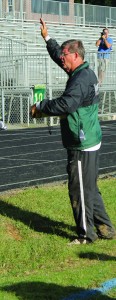
Hours of preparation, little pay and daily practices. All over the country, adults sacrifice extra time to lead students in athletics as coaches. To the casual observer this may seem puzzling. Why would anyone want to dedicate that much time to coach high school sports?
“In high school you coach because you love the sport; it’s a love of the sport and a love of working with kids,” volleyball coach Lynn Smith said.
Most coaches agreed that the extra workload that coaching presented was significant, but none seemed to mind; most were passionate about what they were doing.
“Really the main reason I coach is because I like to just work with young kids,” said social studies teacher Roddy Story, who coaches JV football and JV baseball. “I do spend a lot of time preparing for my classes and coaching, but I like it; it’s not like I’m out there digging ditches.”
Story is busy teaching two Honors Civics classes, an AP Government class and an AVID class on top of his commitment being a head coach.
“All the time, every day it is very hard. I never have enough time,” Story said. “I guess I just work a lot; that’s how I cope with it.”
Athletic director and wrestling coach Jason Amy stood alone describing the extra responsibility of coaching as not anything “overwhelming.”
“I consider myself a machine and I do not allow myself to get overwhelmed,” Amy said. “Being in the physical education department you have obligations to help out with coaching, so I picked a sport I have a lot of passion for.”
Varsity football offensive line coach Kyle Smith said he coaches for “the love of the game” and that he enjoys “seeing kids be successful.”
Smith played football in high school and college and simply wanted it to be a part of his adult life. As a coach and leader of young people, Smith feels you are held to a higher standard.

“I’m representing the school program, I’m representing the coaching staff and I’m representing my family,” Smith said. “You’ve got to live your life to a higher standard – you’re being watched by everybody.”
Most coaches said that the most grueling aspect of coaching is the time commitment.
“People don’t realize the after hours, preparing for games, studying film and putting together drills. When you become a coach, you’ve got to live your life to it,” Smith said.
History teacher and tennis coach Joseph Kiertekles chose a sport he was familiar with and one that he played in college.
“I really enjoy the sport,” Kiertekles said. “I’ve played it since I was a little kid, I enjoy working with the athletes, I look forward to it, it’s the fun part of my day. I get to go out, hit a tennis ball around in good weather and watch the students get better at it.”
Outside of class in a different environment, coaches get to know their students differently.
“You get to interact in a different way, you get to see your students on a more relaxed level,” Kiertekles said.
Bill Hall, head coach of the football program since 1989, is the longest tenured coach currently at Northwood. He found inspiration in one of his past coaches.
“My high school coach, Burgin Bill of Pinecrest High School was a big influence on my life and he’s the reason I wanted to get into coaching,” Hall said. “I respected him, admired what he did for the kids and he was just someone I looked up to.”
“My high school coach, Burgin Bill of Pinecrest High School was a big influence on my life and he’s the reason I wanted to get into coaching,” Hall said. “I respected him, admired what he did for the kids and he was just someone I looked up to.”
“My biggest responsibility is to make sure our coaching staff is prepared week in and week out,” Hall said. “That’s my main responsibility right there: to make sure we’re prepared to give the best knowledge to our players.”
New to Northwood, Bill Renner, the offensive coordinator of the varsity football team, has 28 years of experience in high school coaching. He spent 25 years in Virginia coaching and will now be using that experience to help Northwood make the transition into the competitive world of 3A sports.
“What I learned is when you’re coaching 14 to 18 year old kids something different happens every day that you could never predict,” Renner said. “That un- predictability keeps you young, vigorous and enthusiastic about coming.”
-By John Dunning
